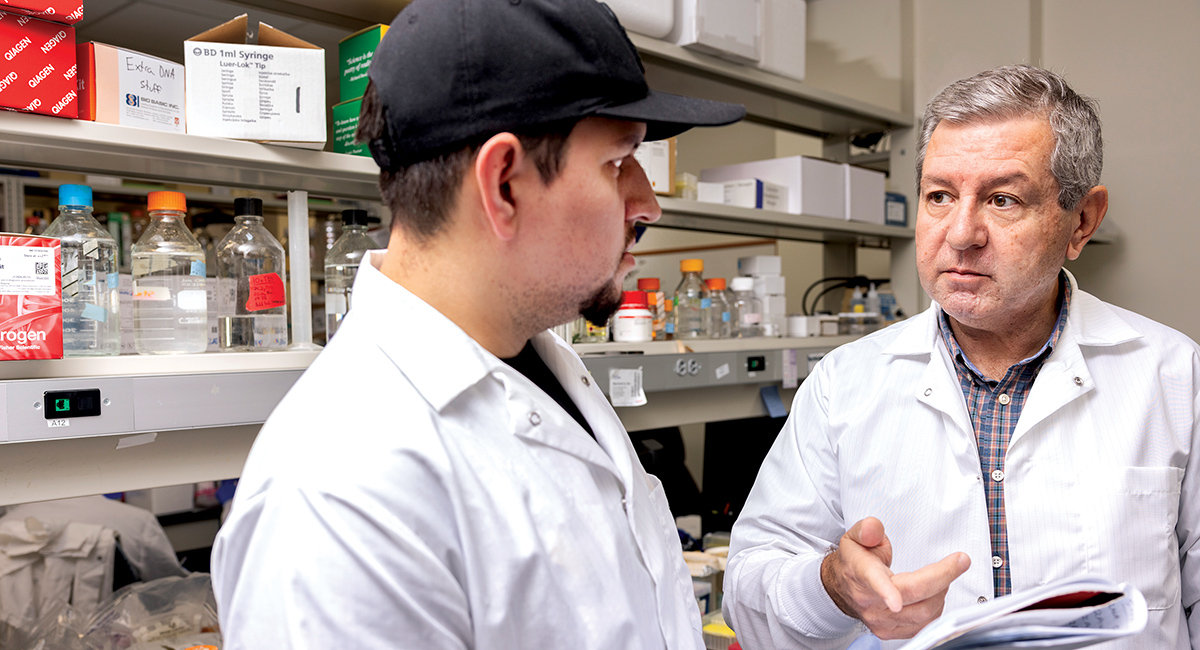Pharmacy professor Jun Zhu, M.D., Ph.D., was awarded his first R-01 grant from the National Institutes of Health in 2009 to improve cognitive care for survivors of HIV. Since then, he and his colleagues at the College of Pharmacy have consistently maintained major federal funding, driving advancements in global health care.
Ongoing research funding, exemplified by Zhu’s work, enabled the College of Pharmacy to secure nearly $13 million in sponsored awards last year — a 67% increase from 2023. This success played a crucial role in the university achieving a record research funding milestone of $309 million in sponsored awards.
“I’ve never had a gap without funding,” Zhu says of his 15 years of study. “When I receive R-01 funding, I am already thinking about the next phase. I look at the whole story.”
Zhu’s success stems from gathering robust preliminary data before submitting grant applications. He emphasizes that those who have a reputation for well-prepared proposals have the highest likelihood of securing funding.
“Don't use your scientific NIH grant to try your idea. You should try your idea in your laboratory to get a premium of data,” he says. “When you submit your grant application to NIH, you should have full confidence this project is the most important.”
For Zhu, a drug discovery and biomedical sciences professor, that means putting in the hours of hard work beforehand during free time, weekends and holidays. “Your intelligence is the most important part,” Zhu says.
His lab aims to be at the forefront of understanding how HIV affects the brain, particularly through its impact on neurotransmitters, the chemical messengers that carry signals between neurons and other cells in the body.
His recent funding renewal, a $3.8 million R-01 grant from the NIH’s National Institute on Drug Abuse, will continue Zhu's exploration of connections between decreased mental functions in people living with HIV.
A shared dedication
Zhu’s persistence and meticulous approach to writing proposals and securing funding is shared by Hippokratis Kiaris, who leads the college’s COBRE Center for Targeted Therapeutics.
In July, the center secured a renewal of its NIH grant of $1,117,500 that will extend phase three through 2029. The phase two funding of $2,235,000 came one year prior in May 2023.
“We develop essentially new knowledge and infrastructure,” Kiaris says. “We have five years remaining through direct support from NIH. Our hope is that the center is not going to cease after phase three and will continue to operate.”
The COBRE Center’s mission began in 2014, and under Kiaris’ leadership for the past two years has expanded its impact into USC’s School of Medicine Columbia, the College of Arts and Sciences and the Molinaroli College of Engineering and Computing.
Kiaris estimates the center has facilitated more than $50 million in research funding, which underscores its role as a catalyst for attracting additional resources through competitive grants and supplements.

Funding the future
According to Kiaris, faculty associated with the COBRE center have published at least 200 scientific papers and earned patents to commercialize the work.
It’s also been instrumental in supporting rising scholars, Kiaris says. “The center has provided funding for salaries, research and mentorship to at least 15 junior faculty members, fostering the next generation of researchers.”
The center also has secured multiple grants for women’s health projects focused on behavioral studies and aging-related research—key areas of impact for the Palmetto State.
It also supports 25 pilot projects across the university. Five were initiated during
the COVID-19 pandemic, which demonstrates its adaptability and relevance in addressing
urgent public health challenges.
“It provides the level of readiness if we face something similar,” Kiaris says. “I
am aware of specific lines of research that continue again to treat COVID-associated
conditions. Inflammation, for example, and viral infections.”
USC ranks among the top 25 colleges of pharmacy nationwide for capturing both federal research dollars and total research dollars.
Thanks to the persistent work of faculty members like Zhu and Kiaris, the college is continuing its trajectory in securing future federal funding and solidifying its reputation as a leader in pharmaceutical research and education.
Reflections of what’s to come always enter Zhu’s thoughts when he and his team receive news of a grant renewal.
“After the first taste of my champagne with my colleagues, I immediately come down,” he says. “I’m thinking about now, once you finish the answer to this question, what is your next?”
Banner image: Pharmacy professor Jun Zhu stands in his lab.
